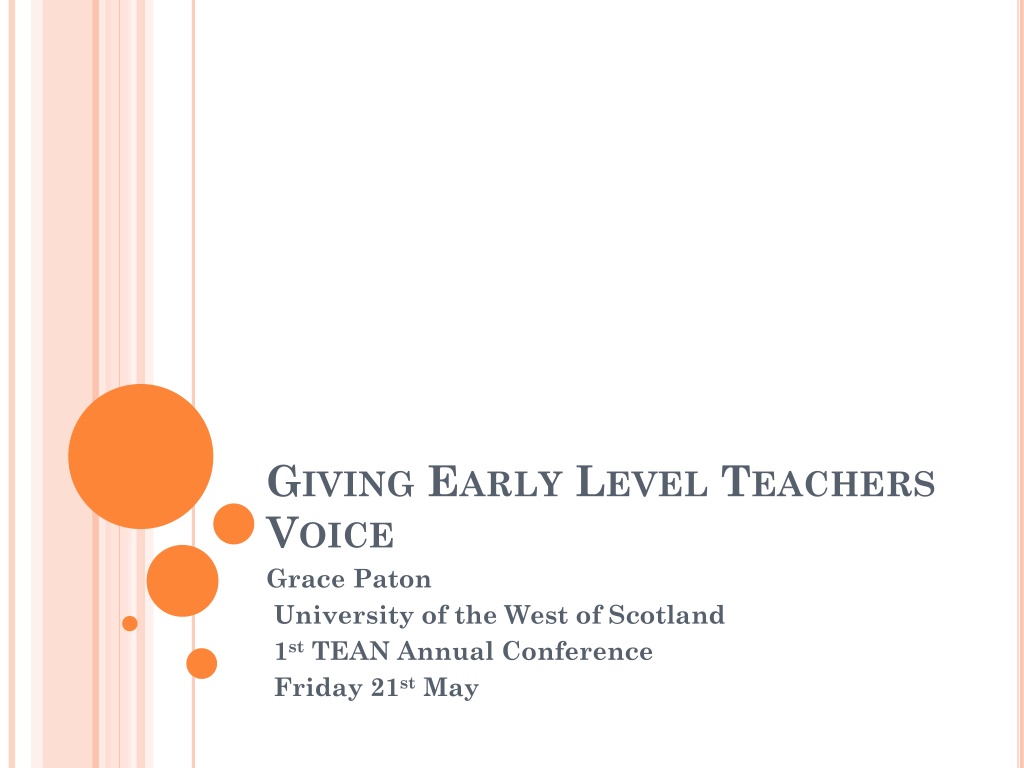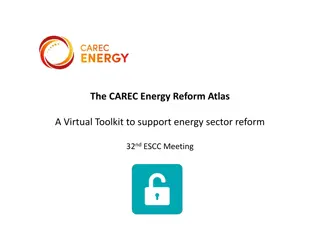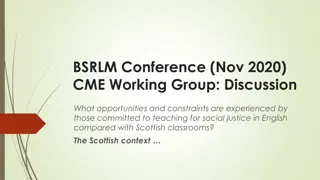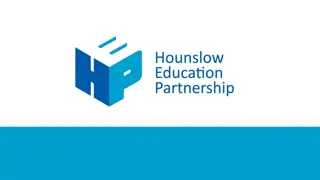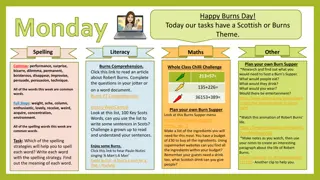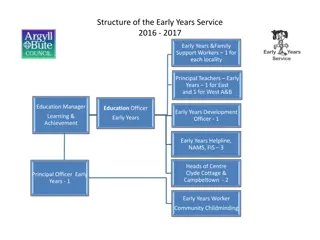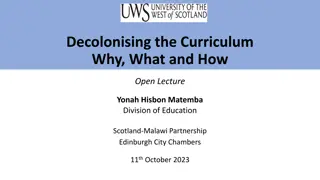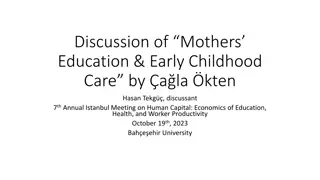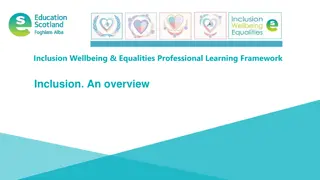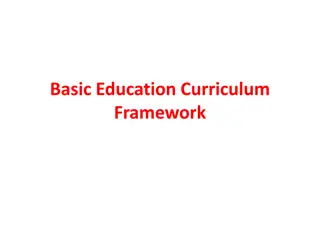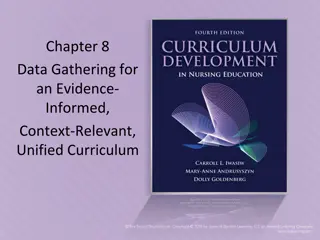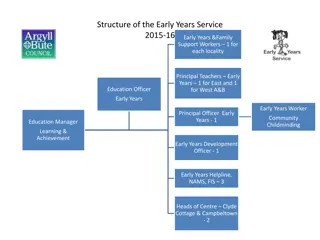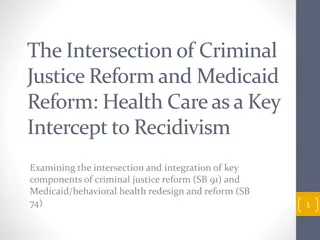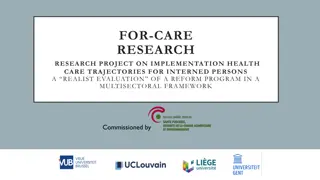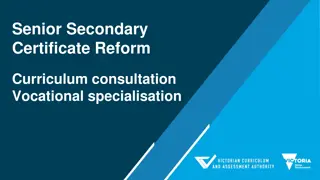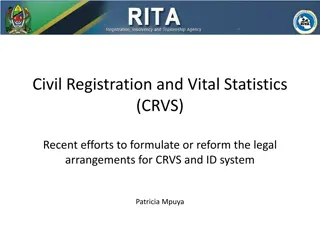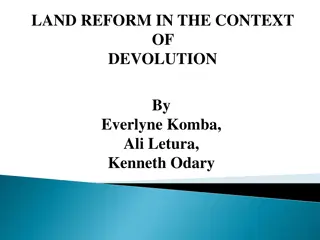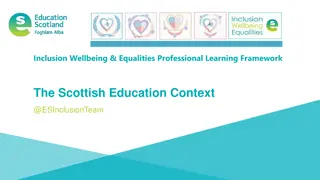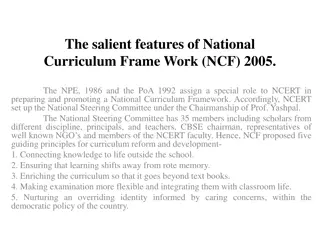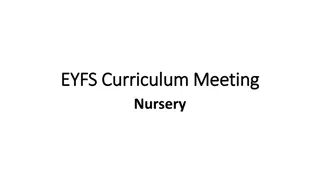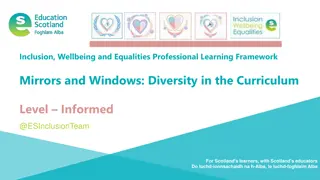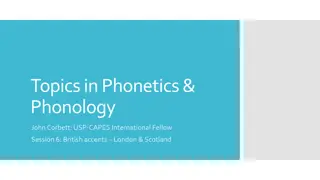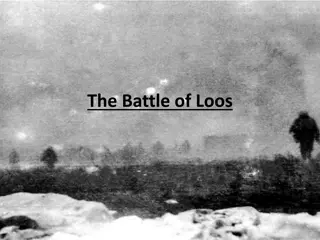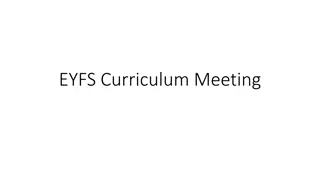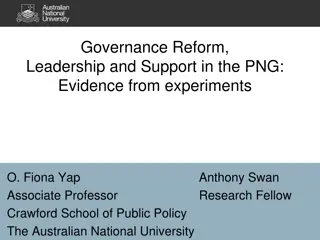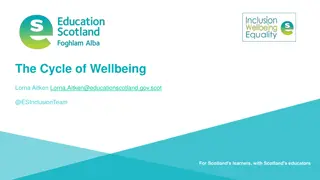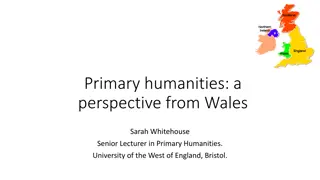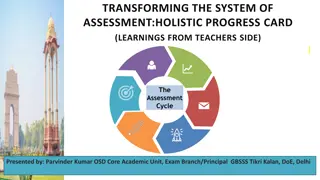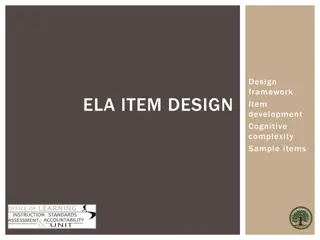Early Years Education in Scottish Context: Curriculum Reform and Assessment Framework
Explore the distinctive features of Early Years Education in the Scottish context with a focus on individual development, child-initiated learning, and active engagement of children as competent learners. Delve into the Curriculum Reform and Assessment Framework in Scotland, emphasizing learning areas over subjects and the importance of assessment to support learning purposes from ages 3 to 18.
Download Presentation

Please find below an Image/Link to download the presentation.
The content on the website is provided AS IS for your information and personal use only. It may not be sold, licensed, or shared on other websites without obtaining consent from the author. Download presentation by click this link. If you encounter any issues during the download, it is possible that the publisher has removed the file from their server.
E N D
Presentation Transcript
GIVING EARLY LEVEL TEACHERS VOICE Grace Paton University of the West of Scotland 1stTEAN Annual Conference Friday 21stMay
THE CONTEXT FOR EARLY YEARS EDUCATION-THE DISTINCTIVE WESTERN FEATURES - STEPHEN(2006) a focus on individual development an emphasis on child-initiated not adult-directed learning learning is co-constructed with adults and peers children are active agents not passive recipients a view of children as competent learners rather than immature adults listening to and respecting children and their choices learning is shaped by context and community.
THE CONTEXT FOR EARLY YEARS EDUCATION-THE DISTINCTIVE WESTERN FEATURES - STEPHEN(2006) areas of learning to structure the curriculum rather than subjects/disciplines general agreement on the areas of development to be addressed: social and emotional cultural, aesthetic and creative physical environmental language, literacy and numeracy.
THE SCOTTISH CONTEXT- CURRICULUM REFORM Previous Framework A Curriculum Framework for Children 3-5 (1999) Reformed framework Curriculum for Excellent (CfE) Early level Covers age range 3-6 years (2004-present) 8 curricular areas 5 developmental areas ( Key Aspects) 66 learning features plain English 145 outcomes and experiences elaborate language 4 purposes- successful learners, confident individuals, responsible citizens, effective contributors Vital contribution of pre-school- develop and broaden learning experiences- confident, eager and enthusiastic learners -looking forward to school Assessment is for Learning Principles recorded in profiles matched to the 5 developmental AIFL principles + A Framework for assessment to support the purposes of learning 3-18
A FRAMEWORK FOR ASSESSMENT TO SUPPORT THE PURPOSES OF LEARNING 3- 18 assess knowledge and understanding, skills, attributes and capabilities assessment will place greater emphasis on literacy and numeracy across the curriculum, health and well being, ICT and higher order skills, including creativity secure learning and progression requires enriching and reinforcing of learning experiences
ASSESSMENT EXEMPLARS ( IN PROGRESS ACCESSED 24/4/10) 24 examples for early level -12 making reference to pre-school practice 4 randomly selected examples, all adult directed, formal learning situations Observations about weather Exploring numbers through stories and games Practise how to do woodwork safely Express feelings through art
MIXED MESSAGES This will mean extending the approaches which are used in pre-school into the early years of primary, emphasising the importance of opportunities for children to learn through purposeful, well-planned play ( CfE, Ministerial Response, 2004) .Another consistent theme running through thinking about young children's learning is the positive value of play. However, it should be noted that the efficacy of play as a medium for learning is more often asserted than evidenced and our understanding of the role of play is limited. ( Stephen, 2006)
MIXED MESSAGES Aspects for Improvement....Staff Interaction with children which extends and challenges children s learning ( HMIE, 2009) Active learning is learning which engages and challenges children s thinking using real life and imaginary situations. It takes full advantage of opportunities for learning through spontaneous play, planned purposeful play, investigating and exploring, life events and experiences and focused learning, supported when necessary through sensitive adult interaction to support and extend play ( Scottish Executive, 2007)
THEORY ,POLICY, PRACTICE The socio-cultural paradigm involves both children and teachers working together towards the upper end of their zones of proximal development ( ZPDs) as they co- construct meaning in higher order thinking ( Vygotsky, 1926) . Two terms which have become associated with working in the socio-cultural paradigm are scaffolding and co- construction ... Both terms can be related to teacher- child interaction ( Jordan 2004) We have found that practitioners endorsed active learning pedagogical rhetoric....but the reality of children s learning experiences was varied and there was not always evidence of the degree of pedagogic awareness on the part of practitioners ( all with teacher education qualifications) that might be expected ( Stephen , 2010)
STUDENTS DEVELOPING A PROFESSIONAL VOICE Iterative construction of professional knowledge Development of skills and justification of their pedagogy Opportunity to develop and articulate professional values Motivation and skill to act appropriately on professional values
ITERATIVE CONSTRUCTING PROFESSIONAL KNOWLEDGE Engagement with relevant theoretical perspectives Using the knowledge to critically examine practice Having opportunities to engage in discussion with colleagues
RESOURCES FOR LEARNING TRIANGLE ( ROLAND, 2000 IN BOLTON, 2005) The public context-knowledge from different disciplines The personal context- knowledge from different personal experiences, reflection The shared context- knowledge of the present student learning process
Developmental psychology, early childhood pedagogy , childhood and family studies, government guidance on early childhood practice Private and individual, questioning and reflecting, reflexive acknowledging own attitudes and values-e.g. Provision for play and active learning Tutor valuing and respecting learners, feedback ,evaluation of the learning experience by students, expectation of tutor action
THE RESEARCH - THE TWO COHORTS OF ITE STUDENTS Professional Graduate Diploma in Education(Primary) - 1 year course Bachelor of Education( Hons)- Year 3 of 4 year course 3rdplacement 4 week placement 80 hours lecturer contact ( 6 weeks) Traditional approach to student learning:- Year group lectures, seminars , workshops. Minimal contact between university and placement Assessment- discursive essay on approaches to learning and teaching in pre-school, drawing on placement experience. I st. placement 3 week placement 32 hours lecturer contact ( 2weeks) A group collaborative learning task, to foster individual and group learning around early childhood pedagogy and Scottish Government policy, supplemented by some lectures and workshops and outdoor learning experience Minimal contact between university and placement Assessment- reflective statement on own ability to promote active learning
STUDENT EVALUATIONS OF THE LEARNING EXPERIENCE B Ed. 3 PDGE(P) Class evaluation( 25) with focused discussion topics- conducted before placement Standard Module evaluation form after placement Very positive about peer group learning , outdoor learning, workshops, set reading Less positive about lack of time available for tutor conducted seminars Enjoyed placement -Would prefer a placement based assessment Focus groups- minimal direction- conducted after placement Standard module evaluation form Very positive evaluation of course as a preparation for placement- enjoyed placement Assessment inappropriate- need to assess student work in placement more consistently
SOME B.ED. QUOTATIONS Books published by people who have researched, nothing to do with government. You get a lot from that, even from people who are American you can get an idea of something you can put into your own practice He said a ghost.. I brought in pens, sheets and gave them choice.. so what do you think we should do so it was very child led. The nursery has a health promotion day and they were getting bags with different types of toys they could get involved with the child at home
SOME B.ED. QUOTATIONS We had an HMI visit one of the things they picked up on was there wasn t enough photographs of the children. You could say you you ve got enough observation notes. To be called a professional you have to constantly evaluate and reflect on your work I think you continue to develop as well, going on courses and finding out what s available and trying to develop your own skills.
SOME PDGE(P) QUOTATIONS This method worked well. Good way of gaining new information. Reinforces own learning and discussion and raises different points Good to hear about active learning in practice. Effective to hear about how CfE is being used in settings More feedback from tutors on discussion of tasks would have been invaluable
SOME PDGE(P) QUOTATIONS Interesting. Good hands on approach. Felt more comfortable than sitting in a lecture theatre ( Workshops) Very good. Gave lots of practical ideas ( Outdoor learning) More opportunities for outdoor learning. Each subject , a session outdoors
FINDING PROFESSIONAL VOICE BEd 3 Some success PDGE (P) - unsuccessful Evaluation prior to placement Limited time for assimilation of knowledge and skill development Many students were focused on subjects / disciplines rather than developmental aspects The assessment indicated the students tended not to subject government guidance to critical reflection Opportunity to evaluate after placement Adequate time to assimilate ideas Opportunity to discuss pedagogy to consolidate understanding Discussion and written assessments indicated developing criticality and personal values
ELEMENTS WHICH FACILITATE DEVELOPMENT OF PROFESSIONAL VOICE Opportunity to read, assimilate and discuss relevant literature and research Open discussion around pedagogy and with more experienced colleagues ( Placement and university) Opportunity to develop practice skill over time Opportunity to discover own professional values which inform pedagogy
BARRIERS TO DEVELOPMENT OF PROFESSIONAL VOICE The proportion of time allocated to early childhood education ( on campus and in placement) is inadequate Partnership between university lecturers and placement mentors is underdeveloped Greater priority needs to be given to developing student criticality and allowing students to express professional values
IMPLICATIONS FOR SCOTTISH ITE PRACTICE CPD to critically examine current curriculum guidance proposals and strengthen University/placement partnership A clear message from the Scottish government on the role of the teacher in pre-school Evaluation of current pilot of an ITE and a CPD qualification focusing on birth to six age range Reform of ITE (currently under review) which takes account of the above
REFERENCES Bolton. G. ( 2005) Reflective Practice. Writing and Professional Development. 2ndedition. Los Angeles, London, New Delhi, Singapore. Sage Publications. Jordan, B (2004) Scaffolding learning and co- constructing understandings in Anning, A. et.al. Early Childhood Education. Society and Culture. London, Thousand Oaks, New Delhi . Sage Publications HMIE (2009) Improving Scottish Education. A Report by HMIE on Inspection and Review 2005-2008. Edinburgh Scottish Office ( 1999) A Curriculum Framework for Children 3-5 Scottish Executive (2004) Curriculum for Excellence . Ministerial Response Scottish Executive( 2007) Building the Curriculum 2. Active Learning in the Early Years Scottish Government ( 2010) Building the Curriculum 5. A Framework for Assessment Stephen, C (2006) Early Years Education: Perspectives from a Review of the International Literature Edinburgh. SEED Stephen, C (2010) Pedagogy: The silent partner in early years learning. Early Years Vol. 30: 1, 15-28
